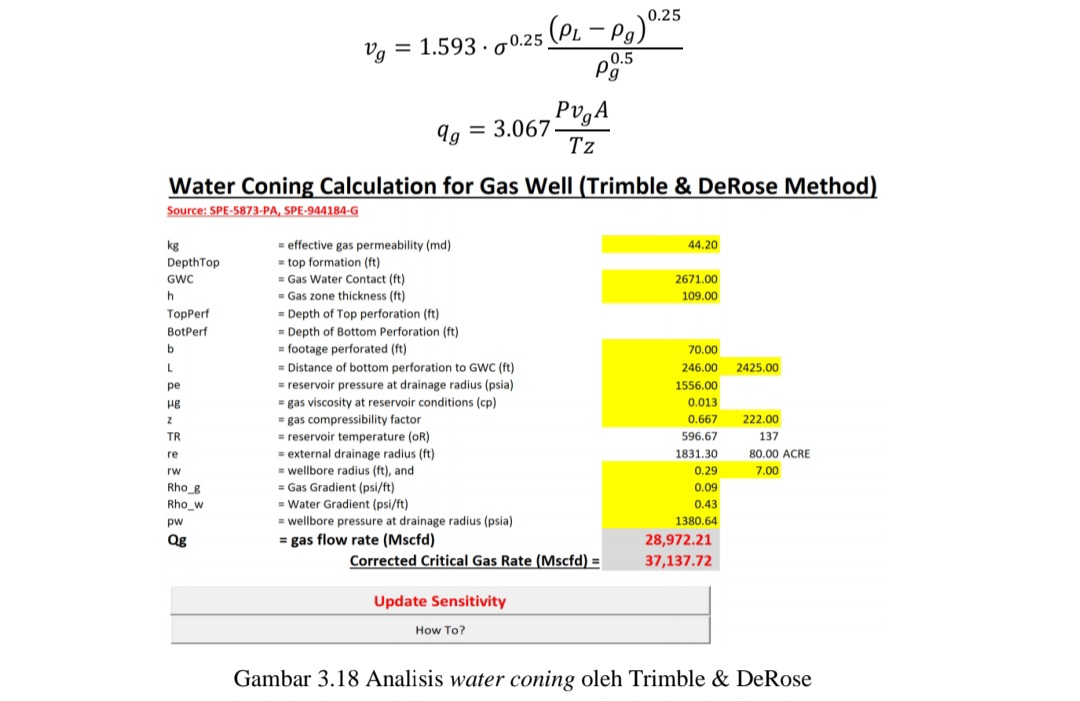Water Coning Calculation for Gas Well (Trimble & DeRose Method)

Understand the Problem
The question focuses on water coning calculation for gas wells, specifically using the Trimble & DeRose method. It involves various parameters and formulas related to gas flow rate and effective gas permeability.
Answer
The corrected critical gas rate is $37,137.72 \, Mcfd$.
Answer for screen readers
The corrected critical gas rate is approximately $37,137.72 , Mcfd$.
Steps to Solve
- Calculate Effective Gas Permeability ($k_g$)
Given the effective gas permeability $k_g = 44.20 , md$, this is a parameter required for further calculations.
- Identify Required Values for Gas Flow Rate ($q_g$)
Using the formula for gas flow rate: $$ q_g = 3.067 \cdot P \cdot v_g \cdot A / (T \cdot z) $$
You need:
- $P$ (Reservoir Pressure): 1556.00 psia
- $v_g$ (Gas velocity): Calculated in the next step
- $A$ (Wellbore cross-sectional area): This may need to be calculated based on well radius $r_w = 0.09 , ft$.
- $T$ (Temperature): Obtain as necessary
- $z$ (Gas compressibility factor): 0.667
- Calculate Gas Velocity ($v_g$)
Using the formula: $$ v_g = 1.593 \cdot \sigma^{0.25} \cdot \left(\frac{\rho_L - \rho_g}{\rho_g^{0.5}}\right) $$
Here:
- $\sigma$ (interfacial tension), $\rho_L$ (density of liquid), and $\rho_g$ (density of gas) are needed parameters.
- Calculate Areas and Further Constants
Calculate the wellbore cross-sectional area $A$ using: $$ A = \pi \cdot r_w^2 $$
Substituting $r_w = 0.09 , ft$: $$ A = \pi \cdot (0.09,ft)^2 $$
- Substitute Values and Calculate $q_g$
Insert the calculated values of $A$, $v_g$, and the known parameters into the gas flow rate equation to find $q_g$.
- Adjust with Corrected Critical Gas Rate
Once $q_g$ is calculated, reference the corrected critical gas rate for additional context: $$ Qg_{corrected} = 37,137.72 , Mcfd $$
The corrected critical gas rate is approximately $37,137.72 , Mcfd$.
More Information
This calculation for water coning using the Trimble & DeRose method provides insights into gas well performance and helps manage water influx, improving extraction efficiency. The calculations involve key physical parameters like permeability and gas properties.
Tips
- Misidentifying Variables: It's crucial to correctly interpret the symbols used in the formulas.
- Incorrect Substitution: Ensure all units are correctly placed and values substituted into the equations appropriately.
- Ignoring Temperature and Pressure Conversions: Units in the input parameters must be consistent, especially pressure (psia) and temperature (°R).
AI-generated content may contain errors. Please verify critical information